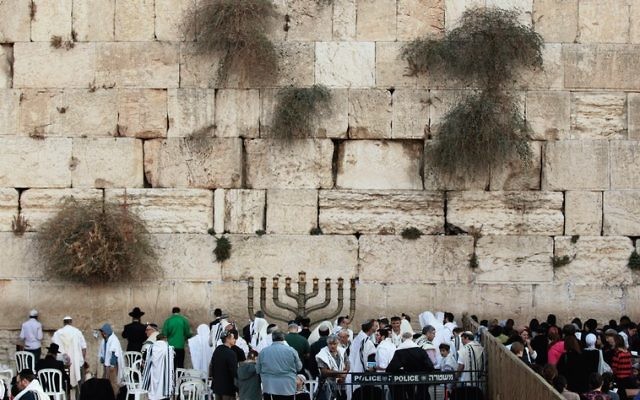The wall we nearly missed
Regardless of each visitor’s religious persuasion, age, education or background, we were together at the Kotel reflecting on our wishes and of those we hold dear to us.
BEFORE I first visited Israel on Birthright, I asked a number of well-travelled family members and friends which aspect of the Holy Land they found most meaningful.
“The sense of spirituality that the Western Wall evokes,” said one friend, while my brother commented, “You feel the intersection of different religions in the Old City and it’s a moving sight that you must experience yourself.”
Some fellow Birthright participants and team leaders who had previously visited the Western Wall shared a similar sentiment.
“It’s an indescribable feeling, you just have to go there to feel its power,” said Birthright participant Naomi Feigen on our flight over to Israel.
This holiest of holy sites and its immense significance was not to be missed.
Except that for our Birthright group it very nearly was.
A few days before we were scheduled to walk through the Old City, Donald Trump made a major foreign policy decision that would turn our tour on its head.
After announcing that the United States would be moving its embassy from Tel Aviv to Jerusalem, violence and protests erupted across parts of Israel. Much to our dismay, Chavaya – our program provider – deemed it unsafe for us to visit the Kotel.
“I am devastated, how can we be in Israel and not go to my favourite place?” remarked Feigen.
As the days wore on, our hopes of setting foot in the Old City were slowly wilting, until Sunday morning when, thanks to the expertise and knowledge of our tour guide Moran Musai and the quietening situation in the Old City, it was announced that we would be walking through the ancient cobbled streets of Jerusalem within a matter of hours.
Trump may try to build his own southern wall but he couldn’t stop us reaching the Western Wall!
As our group gathered in the middle of the Old City – an area at the heart of the Jewish, Islamic and Christian religions – many of us thoughtfully scribbled messages on scraps of paper to wedge between the wall’s crannies.
It dawned on me then what a unifying moment this was for people the world over. Regardless of each visitor’s religious persuasion, age, education or background, we were together at the Kotel reflecting on our wishes and of those we hold dear to us.
This was a seminal moment of the tour. The Old City can evoke powerful emotions and conjure an atmosphere that simply can’t be captured in travel guides and history books or through conversations and lectures.
In a similar vein, it’s possible to understand the geopolitical situation of the Middle East on an academic level, but more difficult to elicit an emotional response and comprehend the complexities of the conflict without seeing the landscape firsthand.
As our group stood at the peak of Mount Bental in the Golan Heights taking in the great panoramic views of Israel on one side and Syria on the other, we appreciated the strategic importance of the area and our close proximity to the violence.
Our understanding of the conflict was enhanced immensely by the inclusion of eight IDF soldiers accompanying us for four days of the trip.
Amid the tension felt across Israel during this turbulent time, we experienced the Holy Land through the soldiers’ eyes, and they through ours.
Together we remembered victims of the Holocaust at Yad Vashem, revelled in the sights and smells of Jerusalem’s bustling marketplace, Mahane Yehuda, and chanted along to our favourite Israeli pop songs.
After farewelling the soldiers and traversing Israel’s breathtaking terrain from the Golan to the rocky sands of the Negev and from the isolated desert mesa of Masada to the eerie serenity of the Dead Sea, we spent our final night on Birthright welcoming in the first night of Chanukah.
At a menorah lighting in Arad, we gathered with local residents at the site where terrorists had claimed the life of IDF soldier Ron Kokia a few weeks earlier.
Our two group leaders, Rabbi David Rubin and Avi Althaus, approached Kokia’s father to share that a group of Australians were present at the solemn ceremony to mourn the loss of Kokia and support the family during their time of grief.
It was an apt moment to reflect on the more sombre aspects of our trip as well as the joyous celebrations.
Birthright strengthened my understanding of spirituality, philosophy and Jewish culture.
The trip would not have been made complete without a wonderful group of engaged participants, two highly knowledgeable and inspiring leaders, and of course, a much-awaited and nearly missed visit to the Western Wall.
SOPHIE DEUTSCH


comments